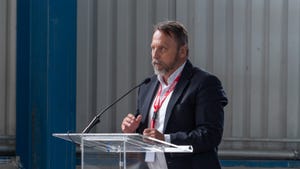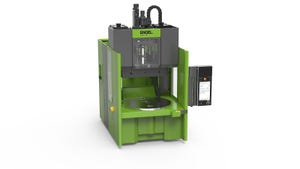Molding the future of thermosets
February 8, 1999
At the 44th Annual Thermoset Molding Conference (TSMC'44, Oct. 15-16 1998, Madison, WI), hospitably hosted by Prof. William W. Wuerger of the University of Wisconsin-Madison, there was some lively give and take on what has to be done on the business side to propel thermoset molding sales and marketing into tomorrow.
For example, Larry E. Nunnery Jr., president of BMC, argued that the SPE is not moving fast enough to include thermoset molding technologies in CPlast, its national certification program for plastics technologists. So far, the program only covers thermoplastics technologies, giving thermoset molders less than a fair advantage to profit from it.
Tom Brylinski of the Durez Development Center mentioned another place where thermoset molders can profit from better exposure: cyber-space. Brylinski admitted he found only one thermoset materials supplier, Plaslok, in a recent search and complained about the lack of moldmakers online. He advised all to register their home pages with search engines. Brylinski cited Thomas Register for helping many thermoset molders register their sites online.
Later, Steve Sinderson, v-p of operations at custom molder Woodland Plastics Corp. (Addison, IL) clued all in on the importance of one form of certification more and more OEMs are looking for: ISO/QS 9000. Sinderson believes all molders will be called on to have ISO/QS certification by the year 2000. Finally, Bill Koepnick of Professional Training Services presented a sobering reality check to all those debating the future of thermoset molding. His talk asked the question, "Is Your Plant OSHA Compliant?"
As he took the group through the excruciating details of what is really involved in compliance, reminding attendees of the costly citations and penalties for serious and willful violations, it was apparent from the rather pained, muffled groans in the audience that Koepnick's question needed a positive answer, today, before discussing thermoset molding's tomorrow.
What Molders Should Do
George Bolton is with Kurz-Kasch Inc. (Wilmington, OH), a $40-million molding company founded in 1916 by an associate of Thomas Edison. He told everyone at the Madison conference what molders will expect from their suppliers in the full-service future being fashioned today by their customers.
"We need each other." That was Bolton's basic message. "We all want the best customers." A new product typically takes about a year. Finding a good new customer can take twice as long, he says. Cooperation is essential. With the increasing number of manufacturing contracts being signed today, partnering is a must. Bolton says good partnering should be based on the following three givens:
Excellence is understood. "Excellence is not an option. 'That's good enough; it will do' can no longer be a part of our vocabulary," Bolton says. Suppliers must ensure their customer service details are excellent. These details can include corporate brochures and publications as well as all technical data and training. Bolton's company encourages suppliers to visit its plants and even make joint customer sales calls. He encourages suppliers to benchmark the best and to emulate them. He calls on those that have not already done so to get ISO certified. ISO, he says, is a great way to iron out details.
Speed counts. Regarding the quickening pace of business and business communications, Bolton says his customers want problems solved immediately. Even voicemail can be frustratingly slow when you're waiting for a supplier's answer while some junior purchasing eager-beaver needs a rapid turnaround on a RFQ. Bolton says rapid tooling is a very eagerly anticipated technology. "Job orders are more frequently being placed on leadtimes, not money." Any assistance suppliers can provide is welcome.It's a small world. As changing trade policies and international exchange rate fluctuations continue to open some doors and close others in the global marketplace, Bolton says suppliers must be able to provide more multicultural tech support to molders. In places like China, Japan, Korea, and Portugal, his company has found English to be OK. It is not like that in Central and South America and in some places in Europe. "All customers want to be addressed in their own language." Metric conversions can be time consuming and difficult, and suppliers should be aware of parochial standards like DIN, JIS, and VIN, and not just ASTM.
You May Also Like


